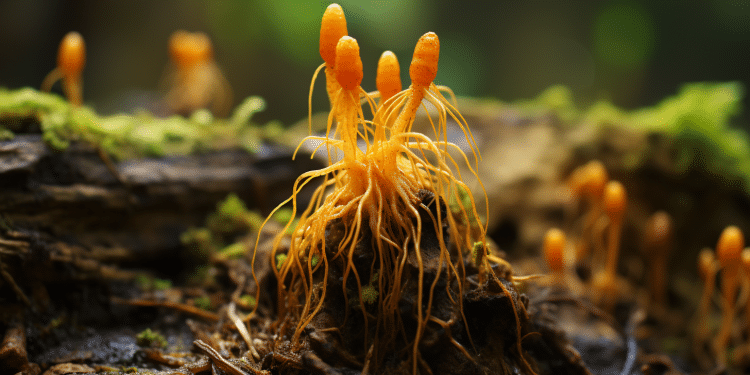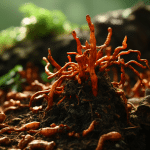Cordyceps has been used as a traditional Chinese medical remedy for some time. It comes from an odd source, a fungus that grows on caterpillars.
Some people use it in an effort to increase energy and enhance wellbeing.
In Chinese medicine, people use cordyceps daily for a healthy body. But let’s take a look at how cordyceps can be beneficial specifically for kidney health.
Benefits of Cordyceps for Your Kidneys
In at least one large-scale trial, cordyceps reduced creatinine levels in chronic kidney patients, and in others, had an effect protecting kidneys against toxic drugs, diabetic complications, and transplant rejection. It also can reduce blood sugar levels. Traditional views believe that taking cordyceps will strengthen your kidneys and regulate the normal functions performed by the kidneys.
The kidneys are our bodies natural filters. They serve various functions, including maintaining acid-base balance, regulating blood pressure, producing hormones, and reabsorbing water, glucose, and amino acids.
Symptoms of kidney dysfunction are usually felt through the affected other organs and systems. Fatigue, joint and back pain, elevated glucose levels, and impotence are all symptoms of kidney health that is in decline.
Recent studies show that cordyceps boosts the potential of the kidneys by increasing the levels of 17-hydroxy-corticosteroid and 17-ketosteroid. A study of 51 patients suffering from chronic kidney failure showed that the administration of 3 to 5 grams of cordyceps sinensis daily dramatically improved kidney function and immune system of patients. Chronic kidney failure, or decreased renal function, frequently causes high blood pressure, proteinuria, and anemia.
One study that included patients with these health problems showed that, after 1 month of taking cordyceps, there was a 15% decrease in blood pressure, significant decreases in urinary proteins, and increases in superoxide dismutase (SOD). Another clinical trial involved 57 patients with gentamicin-induced renal injury, treated either with 4.5g of Cordyceps daily or other, more conventional methods. It was found that, 6 days later, the group receiving Cordyceps had restored 89% of normal kidney function, as opposed to the other groups recovery rate of 45%.
Studies also suggest Cordyceps can improve athletic endurance and tolerance for intense exercises. However, further studies are needed to determine whether cordyceps has any actual benefits for human health. The best dosage for cordyceps has yet to be determined in any condition.
The quality and ingredients of supplements can vary greatly. This makes recommending a standard dosage impossible. Ask your healthcare provider for a recommendation.
Is Cordyceps Naturally Occurring in Foods?
Cordyceps is not found in foods. That’s why it’s important to get cordyceps from high quality supplements.
You can find our favorite capsules, powders, and tincture’s on the following pages of our website and learn more about each individually:
Best Cordyceps Mushroom Gummies
Are There Any Risks with Cordyceps Mushrooms?
Tell your health care provider about any supplements you take, even natural ones. That way, your doctor can monitor for any potential side effects or interactions with medications.
Cordyceps is usually safe, but some people may experience upset stomach, nausea, and dry mouth.
Cordyceps may interact with blood thinners and drugs that suppress your immune system.
Supplements are not regulated by the FDA like medicines are. They are treated like food, and do not need to show they are safe or effective before being sold in the marketplace.
Here’s a video outlining more information on cordyceps for kidney health:
Updated 10/17/2022
Additional Resources:
Does cordyceps help with erectile dysfunction?
Does cordyceps improve lung health?















